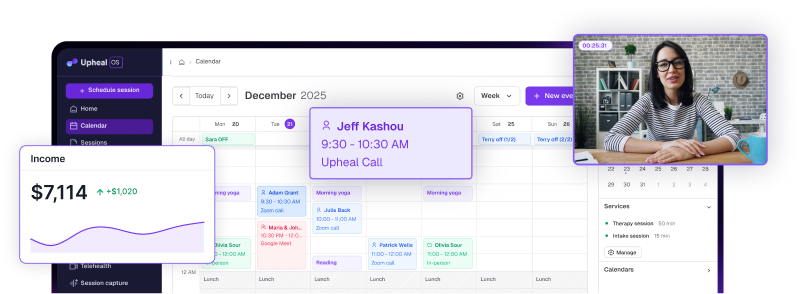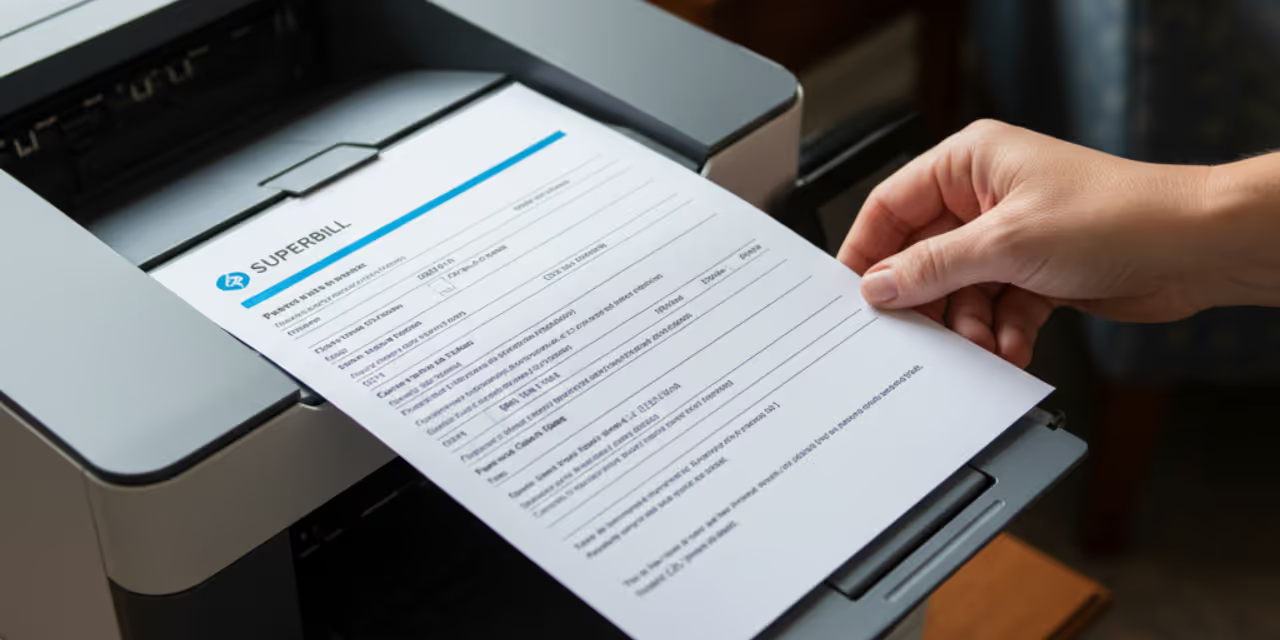6 things I unnecessarily worried about before introducing Upheal into my practice

No. 1 – Reliability and high-quality video calls.
When I started on the team, the product was in its early stages. I was afraid that it would interfere with client trust in that perhaps the video calls wouldn’t function consistently enough and that this would affect session reliability. However, by the time I introduced Upheal into my workflow, my calls (apart from the occasional crackling) have been high-quality and I haven’t had to end a single session or use another video-calling tool yet. However, I understand that some healing professionals might want to keep using their own video-calling methods, like Zoom, and we cater for that. Thanks to our upcoming new Zoom integration, you can receive Upheal notes and insights while still getting to use Zoom.
No. 2 – Asking clients to use yet another piece of software.
We’re all swamped with various technologies and smart apps. I was worried that new clients with whom I hadn’t yet built up a connection would be turned off by having to go through the extra hassle of adopting yet another piece of tech. And, that I would add to the stress of a trauma client who is already overwhelmed and has difficulties just functioning day-to-day. However, thankfully only one client had trouble with set up. I offered to walk them through this in our session and even used the opportunity to develop the client’s confidence and problem-solving skills. That said, I did have to swap to Google Meet to do so, but in the end, it was a camera permissions issue that was fairly easy to resolve.
No. 3 – I wasn’t sure what to expect of the AI notes.
Before the team showed them to me, I had no idea what to expect of AI notes. I felt like I needed to see a sample before deciding whether to use Upheal. If you’d like to test the note-taking quality level for yourself, I totally understand. Just sign up for free, and upload any downloaded video of a therapy session. We tried it on Rick & Morty. Although we’re still improving the notes, they are, I daresay, the best I've seen. Plus, instead of staring at a blank page trying to remember what happened in a busy day full of sessions, I now have a great start.
They’re drafted within about 5-10 minutes of a session for you, and you can simply go in and edit what you need. Upheal also gives you an overview via a list of topics discussed, and provides a session summary, different note types, and insightful analytics which all help to prepare and empower you before, during, and after each session. The graphical representation of session metrics like talking ratio, moments of silence, and speech cadence are a definite wow point for me. I love reviewing these, it's much faster and more immediate as a visual.
Furthermore, the talking ratio allows me to answer questions about my alliance with the client and gives me feedback about the way I’ve shown up in a session as a coach. For example, speaking significantly more than the client immediately lets me know that I was working too hard on behalf of the client, while in contrast, the moments of silence are important in revealing where the client had to focus and work and or found important topics for self-reflection.
Helpfully, Upheal connects these insights to the topics discussed both visually and categorically, so I can always cross-reference the metrics. Speech cadence is more important for therapy work and psychiatry, in that it can indicate mania or depression and I’m looking forward to when we’ll be able to track these over time, potentially even indicating each client’s cycles. The length of these cycles would be really important to document for anticipating client flareups to come, and help them prepare for these in advance with coping skills, tools, resources, or even the booking of additional sessions. Since a host of mental health challenges are cyclical and come in time-based patterns, this would be extremely helpful. Examples include Seasonal Affective Disorder, Borderline Personality Disorder, and Bipolar. But I digress… The notes themselves are high quality and useful during sessions, because I know I can give my full attention to the client instead of struggling to subtly yet comprehensively capture what I need to.
In short: the notes are a real life-changer when it comes to client documentation. It’s so helpful to have additional data inputs and a neutral second source of information to rely on. And apparently, I'm not the only one who thinks so. :)

No. 4 – Explaining what Upheal does, including data processing.
Another thing I wanted to prepare for before introducing my clients to Upheal was my own introduction of the product itself. (Why I had decided to use it, what Upheal offers, how it will impact the client, and so on.) The easy part for me was explaining that it helps with session documentation. The hard part was making a decision for myself as a healing professional about whether I was okay with the processing of session data. I believe each healing professional and each client should choose based on their own preferences whether they are comfortable with session transcripts and recordings. Personally, I came to the conclusion that the help they give outweighs the risks, but every therapist and client should make that decision for themself. That's why Upheal always allows you to opt-out of sharing data, and why we only collect data when you have explicitly opted in.
No. 5 – The idea of AI and therapy.
As AI goes through the startling evolution of our world, it’s going to be affecting a lot of different areas, from leisure services to healthcare products and services. There are certainly discussions around the latter since it comes with the necessary storing and processing of personal information. We recently wrote about our HIPAA compliance and will be sharing more about the ways we work with data and how we work with AI too in our new, About Upheal blog series. When it comes to therapy and AI, it’s not only about how we incorporate it securely and privately into the therapeutic process, but also how we treat it ethically, so that people aren’t left self-medicating and treating themselves without professionally trained intervention – AI should never replace a human therapist.
No. 6 – My own trauma hangover and fear of the new.
Finally, one last thing that kept me from using Upheal sooner was my own trauma history. Sometimes, I still find myself rejecting the new, even and especially if it can help me help myself. Since it can still feel overwhelming to do both good and new things for myself at times, I had to prepare for using Upheal very strategically – including the mental load of how I was going to introduce it to my clients, which of them I would and wouldn’t use it with to start, and how I’d incorporate it into my workflow on a daily basis. But, as us psychologists know better than anyone else, we humans like the familiar. New things require getting used to, and processing them when you’re already stretched thin isn’t a great thing if it’s not going to be worth your time! Thankfully, Upheal is very much worth it.











